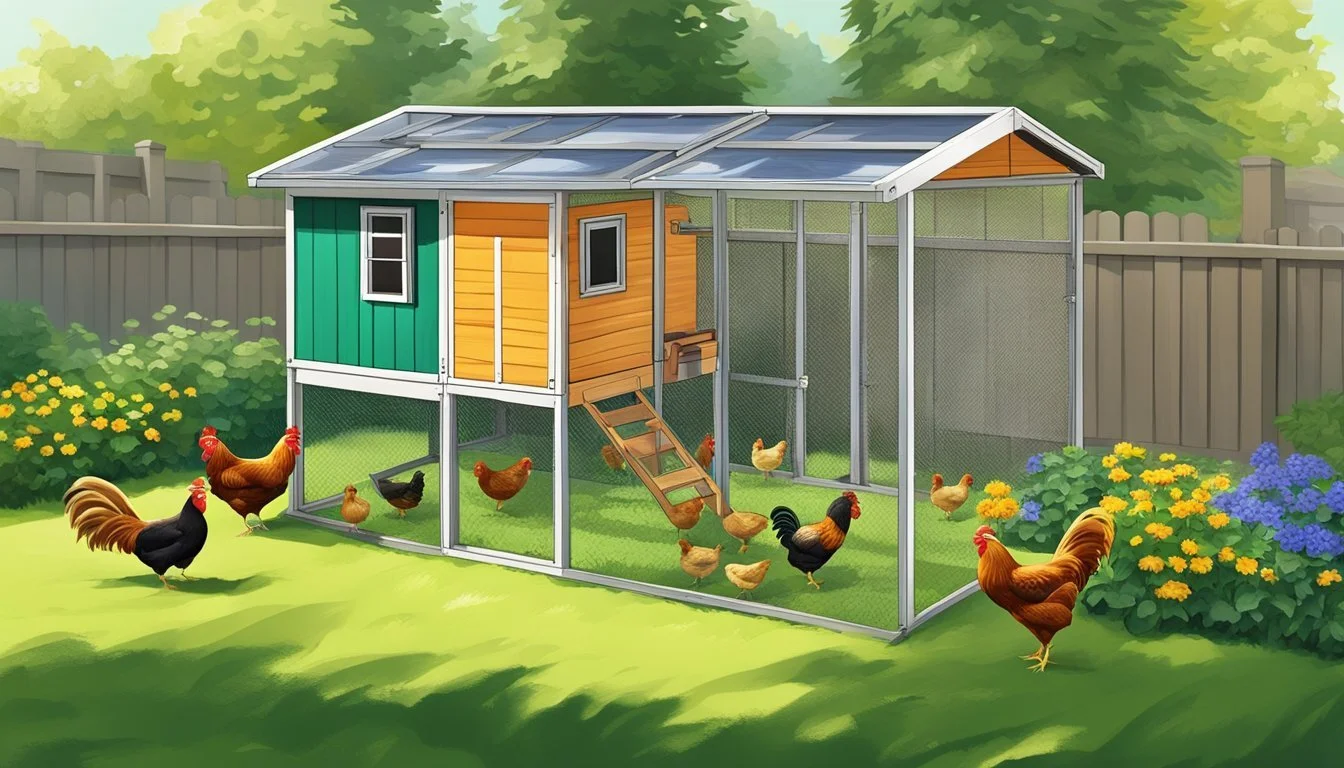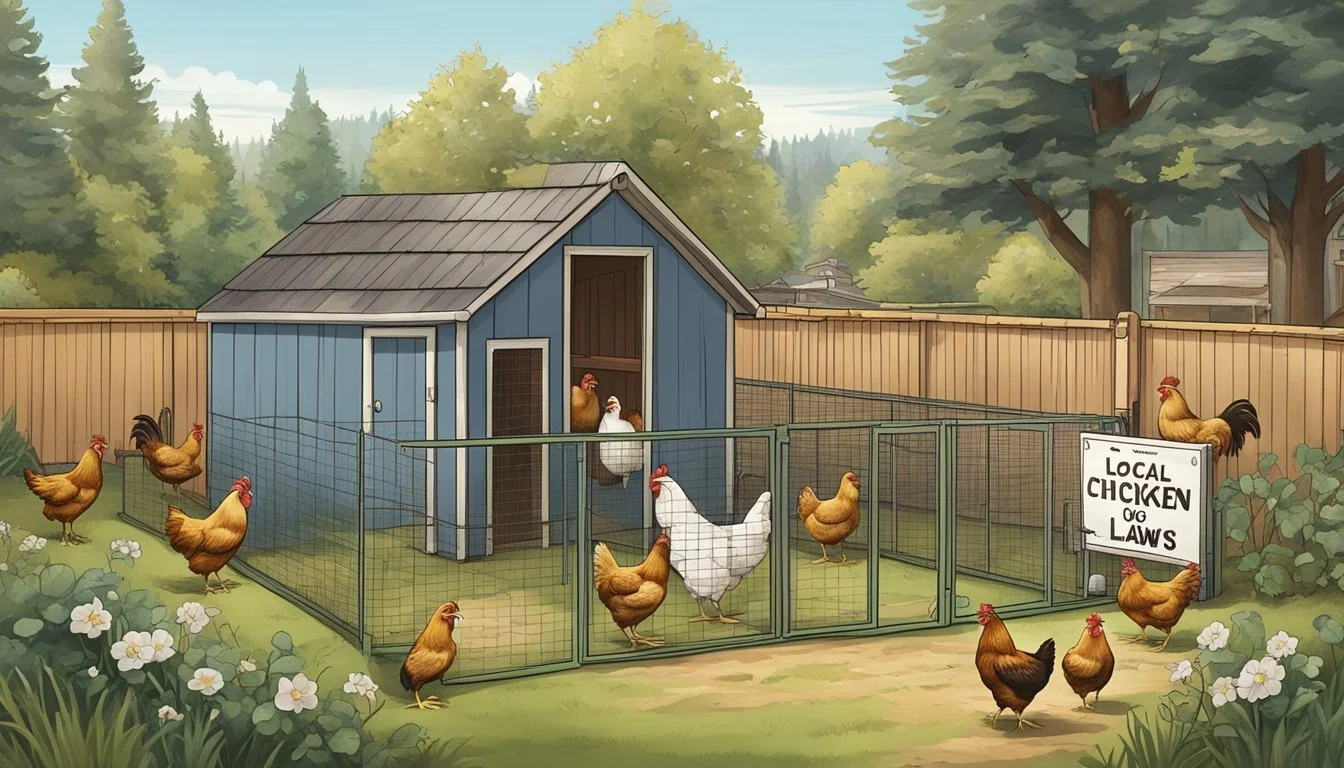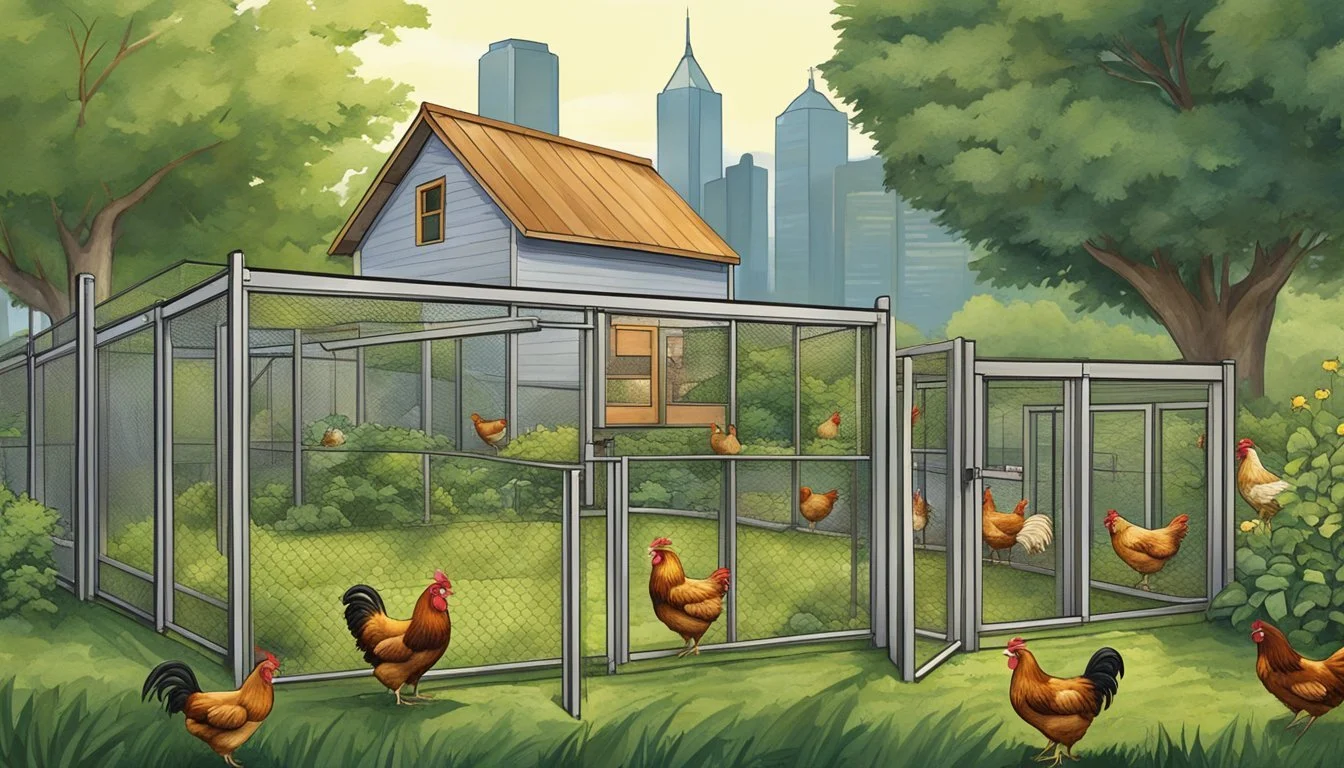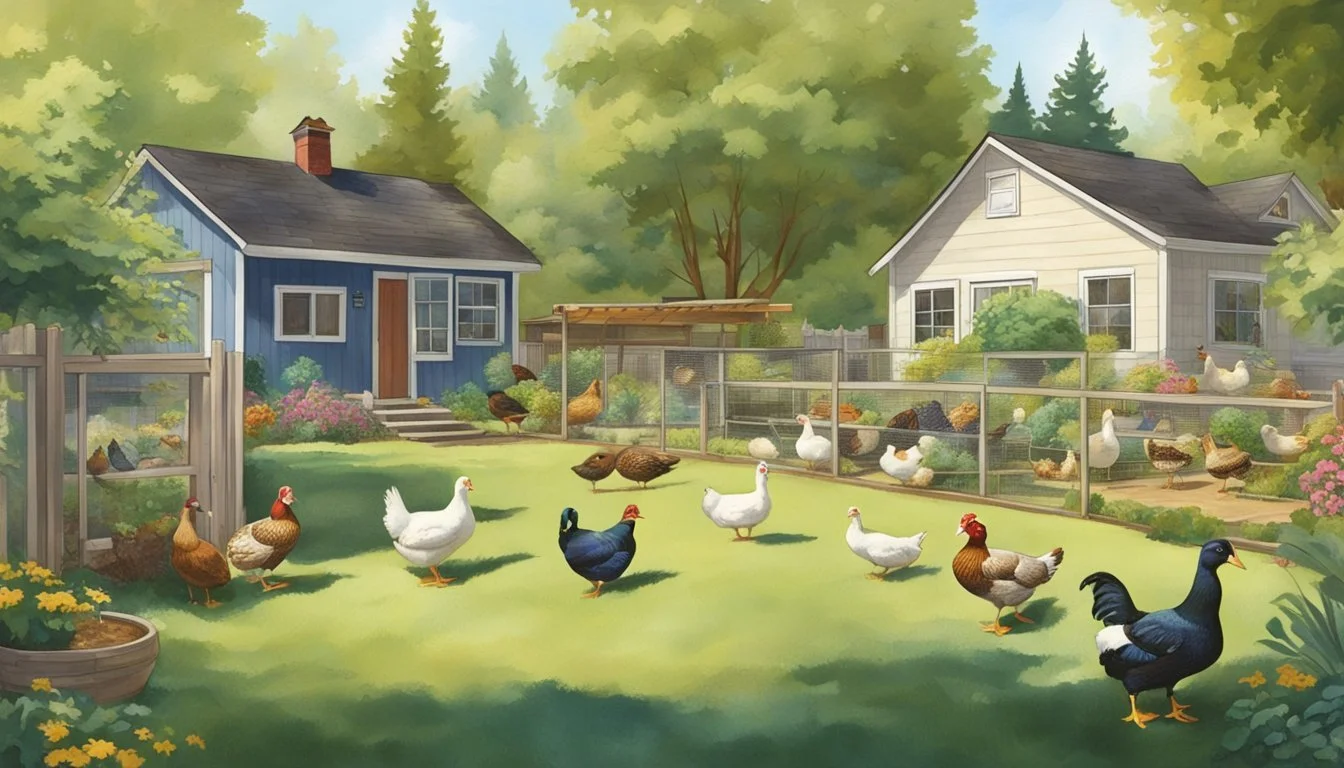Keeping Backyard Chickens in Tacoma, WA
Essential Guidelines for Urban Poultry Farmers
Backyard chickens have become increasingly popular among residents of Tacoma, WA, as a way to connect with their food sources and embrace sustainable living. Tacoma's urban and residential areas are adapting to this trend with specific regulations designed to balance urban farming benefits with community standards. Local ordinances provide a framework that allows individuals to raise chickens responsibly, specifying that coops must be at least 12 feet from any residence and that building permits are required for coops larger than 200 square feet.
However, not everyone can keep chickens in every part of Tacoma. The city stipulates that chickens and other poultry are not permitted to roam freely in streets, alleys, or public spaces, and the keeping of roosters is prohibited to minimize noise. Meanwhile, the Tacoma Municipal Code underlines the necessity for safe and sanitary conditions to prevent any potential nuisance or health hazards for both the poultry and the public.
Engaging in the practice of keeping backyard chickens in Tacoma does require adherence to certain guidelines, spaces, and rules, yet it is an attainable goal for city dwellers. It offers a combination of environmental stewardship and the enjoyment of fresh, locally produced eggs, all while fostering a sense of agricultural connection in an urban setting. Residents partake in this experience, embracing a slice of rural life within the cityscape, as Tacoma supports sustainable agriculture initiatives.
Benefits of Raising Backyard Chickens
Raising backyard chickens in Tacoma, WA, is becoming increasingly popular for its tangible returns and alignment with sustainable living. Residents find joy and utility in this practice that extends beyond just pet ownership.
Fresh Eggs and Sustainable Living
Individuals raising chickens enjoy the pleasure of collecting fresh eggs. The taste of eggs from backyard chickens is often found to be superior to those purchased from a store. More importantly, producing eggs at home contributes to sustainability efforts; it reduces the reliance on commercial farming, which often involves significant energy use and transportation. Households know exactly what their chickens consume, allowing for an organic option that supports a more self-sufficient lifestyle.
Natural Garden Pest Control
Chickens are natural foragers and serve as effective pest controllers in gardens. They consume a variety of bugs, insects, and sometimes small rodents, which helps maintain the ecological health of a backyard without the use of chemicals. Not only does this aid in garden maintenance, but it also promotes a balance of energy use by allowing chickens to supplement their diet naturally.
Understanding Tacoma's Chicken Laws
Tacoma's chicken laws are designed to manage urban poultry farming effectively. The city's regulations emphasize suitable coop construction, a definitive limit on the number of chickens, and restrictions on keeping roosters.
Tacoma Municipal Code for Chickens
The Tacoma Municipal Code stipulates strict regulations regarding the habitation of chickens within city limits. Notably, coops are required to be set back 12 feet from any residence. Furthermore, if a chicken coop is larger than 200 square feet, a building permit must be obtained from the city.
Legal Number of Chickens Allowed
According to the city's regulations, the legal number of adult chickens allowed per residential parcel is capped at six. This limitation ensures that residents can keep chickens while minimizing potential disturbances and maintaining sanitary conditions. This limit excludes pigeons, of which residents are permitted to keep an additional six.
Restrictions on Roosters
The City of Tacoma imposes restrictions on keeping roosters due to noise considerations. Roosters are known for their early morning crowing, which can be a disturbance in densely packed urban environments. Residents concerned about these regulations may contact the Tacoma Planning and Development Services for more detailed information on the restrictions.
Setting Up Your Coop and Run
Before choosing a coop and designing a run, one must consider local regulations and the importance of maintaining a clean and healthy environment for the chickens.
Choosing the Right Coop Design
When selecting a coop design, consider the size of the backyard and local Tacoma regulations, which state that there should be a 12-foot setback from any residence for the coop. A coop larger than 200 square feet requires a building permit. Here are important aspects to focus on:
Space: Provide at least 10 square feet per chicken to ensure they have enough room.
Security: Use padlocks and secure latches to protect chickens from predators.
Accessibility: Include doors for easy cleaning and egg collection.
Ventilation: Good airflow is crucial to keep the coop dry and prevent the buildup of harmful ammonia gases.
Maintaining Sanitation and Health
Sanitation is paramount for preventing disease and keeping a flock healthy. One must routinely perform the following tasks:
Cleaning: Remove droppings and refresh bedding material regularly.
Disinfecting: Use appropriate sanitizers for cleaning feeders, waterers, and the coop itself.
Pest Control: Implement measures to control mites, lice, and rodents.
Inspections: Regularly check for signs of illness or distress in poultry.
Chicken Health and Welfare
Maintaining the health and welfare of backyard chickens in Tacoma, WA, involves vigilance against disease and providing a balanced diet. Proper care ensures a thriving flock.
Preventing and Identifying Diseases
Prevention is crucial for maintaining chicken health. One should regularly clean and disinfect coops, provide vaccinations if recommended, and practice biosecurity measures to prevent the spread of diseases. Owners should be aware of common symptoms such as lethargy, ruffled feathers, or decreased egg production, which might indicate illness. The Washington State Department of Agriculture's Avian Health Program provides resources for disease management and reporting.
Common Diseases:
Avian Influenza: Symptoms may include breathing difficulties and blue comb or wattles.
Marek's Disease: Causes paralysis in chickens.
Coccidiosis: An intestinal disease signaled by diarrhea, often with blood.
Immediate consultation with a veterinarian is essential if disease symptoms are observed.
Nutrition and Diet Essentials
Providing a balanced diet is vital for chicken health. Their diet should consist of commercial poultry feed, which is formulated with necessary nutrients, along with occasional grains and vegetables for variety.
Essential Nutrients:
Proteins: Crucial for growth and egg production.
Carbohydrates: Provide energy.
Fats: Needed in moderate quantities.
Vitamins and Minerals: Necessary for various bodily functions.
Access to clean, fresh water is also critical. Changes in diet or lack of any essential nutrient can lead to health issues. Regular observation and care are the keys to ensuring the well-being of backyard chickens in Tacoma.
Local Resources and Community
In Tacoma, WA, residents have access to a vibrant community and a variety of resources dedicated to supporting backyard chicken keepers. Whether one is experienced or new to poultry, the local offerings ensure that all keepers can find the supplies and advice they need.
Finding Supplies and Feed in Tacoma
Local Stores:
Urban Feed and Garden: A go-to spot for chicken feed, supplies, and coop necessities.
Tacoma Farmers Market: Offers seasonal opportunities to purchase organic feed and locally-sourced chicken essentials.
Online Options:
Tacoma residents can also find supplies through online retailers with local delivery options, ensuring convenience for chicken keepers.
Workshops and Local Chicken Enthusiasts
Workshops:
City of Tacoma: Periodically offers workshops on sustainable agriculture, including the care of backyard chickens.
Local Farm Stores: Often host classes on a variety of topics ranging from chicken health to coop construction.
Community Groups:
Chicken enthusiasts in Tacoma often gather in online forums and social media groups to share tips, trade stories, and offer support to one another.
Neighbors sometimes form informal networks to discuss the joys and challenges of raising chickens, fostering a supportive local community.
Additional Considerations
Before delving into the backyard chicken-keeping practices in Tacoma, WA, one must consider the intricacies of zoning regulations, the importance of maintaining good relations through written consent, and the proactive steps required for wildlife and rodent prevention.
Understanding Zoning Regulations
In Tacoma, regulations stipulate specific requirements for the location and size of chicken coops. Setback requirements state that coops must be 12 feet away from any residence if they exceed 200 square feet, a building permit is necessary. These regulations ensure that chicken-keeping practices adhere to the city’s standards, thus preserving the welfare of both the residents and the poultry.
City Limits: Chickens are not allowed to roam freely on streets, alleys, or public areas within Tacoma city limits.
Parcel Size: For properties larger than 10,000 square feet, one additional adult poultry is allowed per each additional 5,000 square feet of area.
Written Consent and Neighbor Relations
Good neighbor relations are crucial when keeping backyard chickens. One should acquire written consent from neighbors, especially in residential areas where close proximity might lead to disturbances. It is a sign of courtesy and also helps in avoiding potential conflicts.
Noise Considerations: Since roosters are prohibited due to noise concerns, only hens are typically allowed in residential settings.
Wildlife and Rodent Prevention
Chickens can attract unwanted wildlife and rodents if proper preventive measures are not in place. It is essential to design coops and feeding practices to deter rodents and protect poultry from predators.
Coop Design: Secure and robust coop construction to prevent wildlife access.
Feed Storage: Storing feed in rodent-proof containers to avoid attracting rodents.
By considering these factors, potential chicken keepers in Tacoma can ensure they maintain compliance with local regulations, foster positive neighborly relations, and safeguard their flock from common urban poultry-keeping challenges.
Beyond Chickens: Other Domestic Fowl
While chickens are a popular choice for backyard poultry enthusiasts in Tacoma, WA, other domestic fowl such as turkeys, ducks, and geese also present appealing options for suburban households. These species can bring diversity to a backyard setting and potentially serve various purposes from eggs to meat production, and even as pets.
Raising Turkeys, Ducks, and Geese
Turkeys provide substantial meat yields and require more space compared to chickens. They are also social creatures, which means it's often recommended to raise them in small flocks.
Ducks are known for their egg-laying abilities, especially breeds like Khaki Campbells and Indian Runners. They have different housing and water needs, as ducks require access to water for cleaning their nostrils, eyes, and preening their feathers.
Geese serve as excellent "guard animals" due to their territorial nature. These birds also require access to water for optimal health but can thrive on a diet similar to that of chickens.
Local Regulations for Other Poultry Species
Pierce County Regulations stipulate that residents must comply with certain conditions when raising poultry, which include turkeys, ducks, and geese:
Animal Enclosures: All birds should have appropriate shelters that align with county specifications.
Numbers Allowed: Limits on the number of birds per parcel may apply.
Distance from Neighbors: Enclosures must be set at a minimum distance from neighboring residences to avoid nuisance complaints.
For those residing within the city limits of Tacoma, regulations concerning domestic fowl beyond chickens may vary. It is the owner's responsibility to contact Tacoma city officials or review the Tacoma Municipal Code for detailed requirements applicable to turkeys, ducks, and geese. This may include space requirements, potential need for permits, and specifications for enclosures, among other rules. Enthusiasts should always ensure they meet all local ordinances before embarking on raising different poultry species.
Responsibilities of a Backyard Chicken Owner
Raising backyard chickens in Tacoma, WA, entails ensuring legal compliance and providing ethical treatment to the birds, alongside the potential participation in exhibitions and fairs. These facets present distinct responsibilities for the chicken owner.
Ensuring Compliance and Ethical Treatment
Owners must be familiar with Tacoma's municipal code regarding chickens, which mandates a 12-foot setback from residences for chicken coops, with structures over 200 square feet requiring a building permit. Tacoma allows up to six adult chickens per parcel without needing consent from neighbors. Ethical treatment encompasses providing adequate space, nutrition, and care — all to guarantee the chickens' well-being.
Housing: Coops must be clean, ventilated, and safe from predators.
Feeding: Chickens require a balanced diet with grains, proteins, and access to fresh water.
Healthcare: Regular vet checkups and vaccinations are crucial.
Participation in Exhibitions and Fairs
When chickens are raised for exhibition, they require meticulous grooming and training to meet the specific standards of such events. The participation of chickens in fairs or exhibitions is an opportunity for owners to showcase their dedication to raising healthy and well-cared-for birds.
Preparation: Training for handling and behaving well in various environments.
Documentation: Keeping accurate records of the chickens’ lineage, health, and exhibition results.










